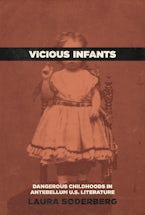Childhood as scholars often recognize it—innocent, vulnerable, and above all, precious—is anchored in the cultural imagination of the early nineteenth-century United States, when an attitude of child worship drove sentimental politics and literature. But, not all childhoods were defined by love, education, and nurture. Singled out by nineteenth-century legal and medical establishments, children already marginalized by slavery, ethnicity, and poverty were increasingly branded as “incorrigible," delinquent, and antisocial.
Vicious Infants offers a counterhistory of literary childhood as both perceived social threat and site of resistance, revealing that many children were not only cut off from family and society, they were also preemptively excluded from the rewards of citizenship and adulthood. Turning to prison documents, medical journals, overlooked periodical fiction, and literary works from William Apess, Harriet Wilson, Herman Melville, Susan Paul, and Harriet Beecher Stowe, Laura Soderberg recovers alternate narratives of childhood and provides an important window into the cultural links between race, reproduction, and childhood in the antebellum period.


